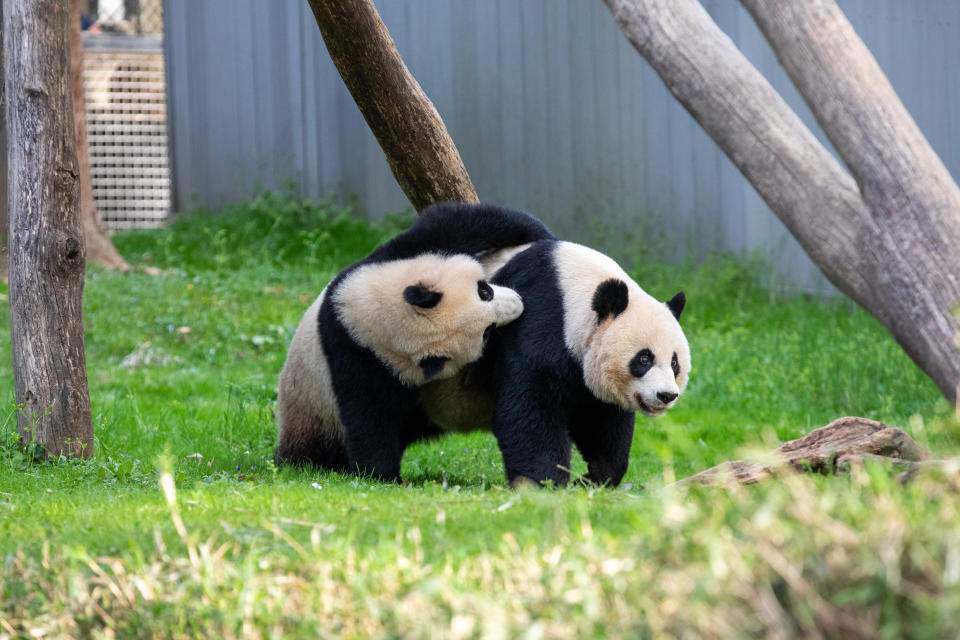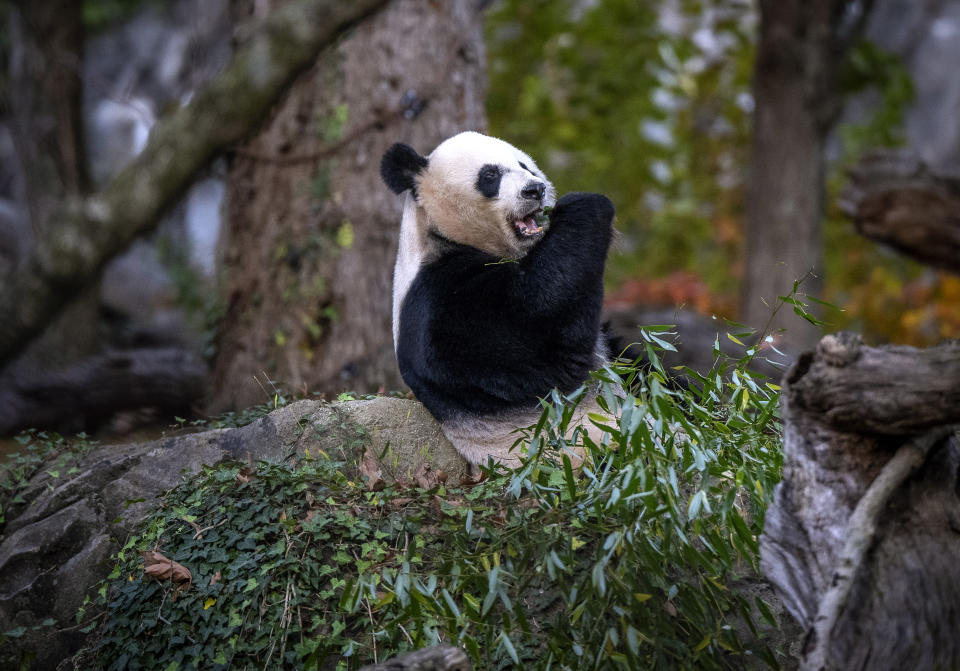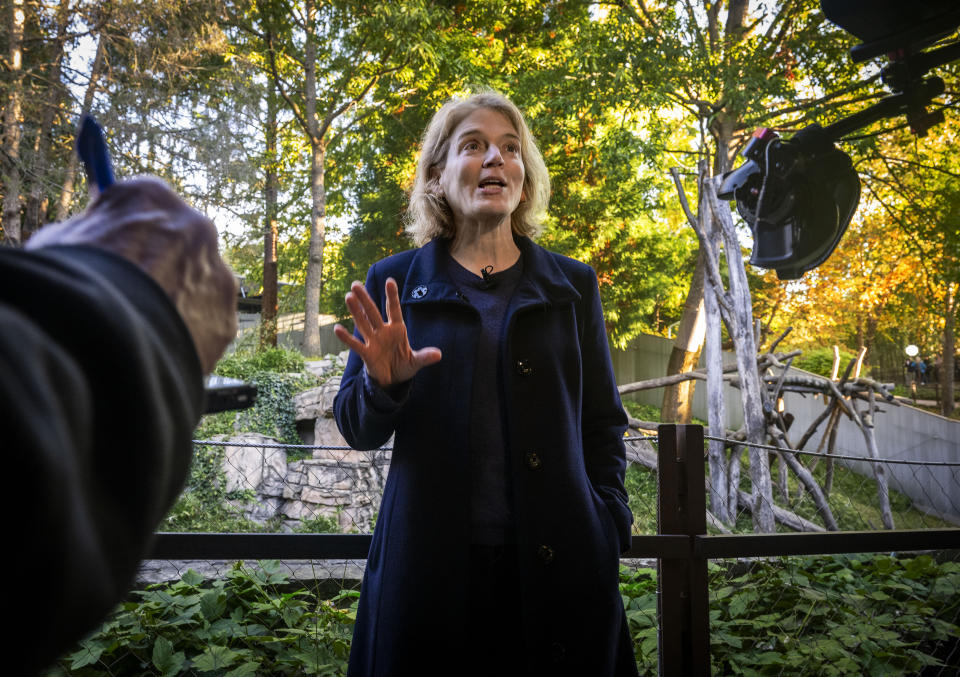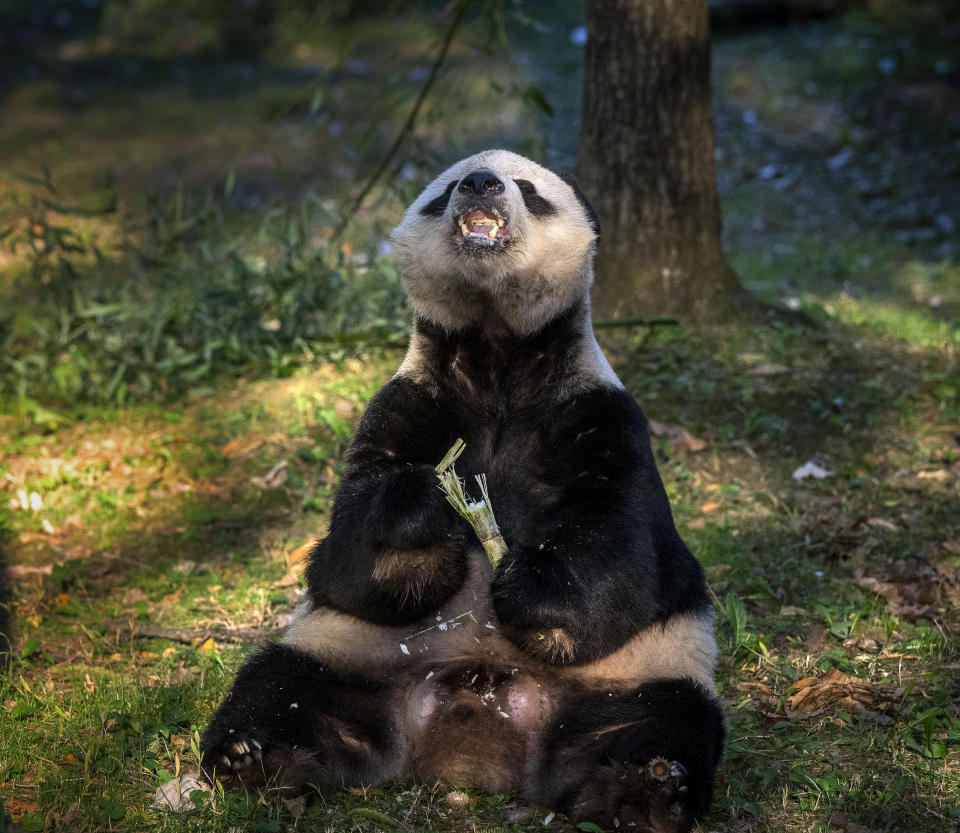Caretakers get giant pandas ready to leave for new home in China
"Tian Tian!" animal keeper Trish Jarvis called out. "Tian Tian!"
Jarvis stood at a railing of the National Zoo's outdoor giant-panda compound Wednesday holding two fat stalks of sugar cane.
Tian Tian, the zoo's adult male giant panda, slowly began making his way down the hill toward her.
"Good boy!" she called.
As he came within range, she threw the stalks toward him. He grabbed one and began to munch. "When he's chewing, his ears will move," she pointed out.
It was a pleasant moment on a sunny morning. But time is quickly running out on such scenes at the zoo.
The Smithsonian facility said Wednesday its remaining three giant pandas - Mei Xiang, 25, and Tian Tian, 26, and their son, Xiao Qi Ji, 3 - will be leaving for China before Nov. 15.
As the pandas lounged and gnawed sugar cane and bamboo, zoo officials Wednesday detailed some of the preparations for the departure, and for the post-giant-panda era at the zoo.
The zoo's director, Brandie Smith, said that while the zoo has indicated to the Chinese its interest in having more giant pandas, no official discussions have taken place. "We're not having those conversations yet. … If they came here, when would they come here, what would the next agreement look like."
"But we have been very clear that we do want to continue this panda program," she said.
China owns and leases all giant pandas in U.S. zoos. The National Zoo's giant pandas are going to China because the current lease agreement expires Dec. 7.
Zoo officials said they don't know how long the zoo will be without giant pandas. They plan to renovate the giant panda compound with an eye to future pandas, as well as other animals that might occupy the space for a time. For now, Smith said, the focus is on the safe departure of these three bears.
"It's an incredibly complex endeavor," she said Wednesday. "There's zero margin for error."
"I almost can't let myself think about how I will feel when these animals are gone," she said. "It's the end of an era for us."
"I think about it almost like them going to college," she said. "You know it's going to happen. It's about to happen. You prepare for it for so long. But on the day that it actually does happen, you're just, like, a bawling mess."
When they leave, they will have one big piece of luggage.
"It's like their carry-on," said Bryan Amaral, the zoo's senior curator.
But it won't fit in an overhead bin. "It's humongous," he said.
It is a large container that will hold bamboo - around 300 pounds of it - as well as water, produce and nutrition biscuits for the 19-hour, 9,000-mile journey from Virginia's Dulles International Airport to Chengdu, China.
The animals are scheduled to be in three separate shipping containers aboard a massive Boeing 777 FedEx cargo plane decorated with a huge giant-panda logo.
Because Russian airspace is closed to American carriers as a result of the Ukraine war, officials said, the plane will take a route over the Pacific Ocean that adds about five hours, 500 miles, and a refueling stop in Alaska to the trip. FedEx said the three previous panda flights from Washington to China took a shorter, nonstop route across the Atlantic.
It will be the end of a glorious 51-year era in Washington that goes back to 1972, when China gave the National Zoo its first two giant pandas, Ling-Ling and Hsing-Hsing, at the height of the Cold War rivalry between the United States and China.
Since then, giant pandas at the zoo have come and gone, been born and passed away. Generations of visitors have delighted in their antics. Some have been obsessed. Now the black-and-white bears are about to leave the city devoid of giant pandas for the first time in 23 years - and probably for the foreseeable future.
"It's an emotional time around here," Nicole MacCorkle, a keeper who has helped care for giant pandas at the zoo for 22 years, said in a telephone interview last week. "We're just trying to soak in all the moments, and really appreciate what special individuals they are, and just have that quality time."
Scheduled to go along on the departure flight are panda keepers Laurie Thompson and Mariel Lally and zoo veterinarian James Steeil.
"It's very sad," Thompson said Wednesday. "To have no pandas here is going to be sad. If at least one of them were still here, I think it would be a little easier. But since they're all going, it's going to be awful."
Two of the white steel-and-Plexiglas transport containers have already been delivered to the zoo, MacCorkle said. The third won't arrive until the day of departure.
Amaral said the first two shipping containers were delivered well before the departure so the animals have time to get used to them.
"We get the transport containers in advance of the shipment, and we actually train the pandas to go into them," Amaral said. "So that they're comfortable with the spaces before the day of the shipment."
Tian Tian and Mei Xiang have already explored them, MacCorkle said. At first, the keepers leave both sides of the containers open, and the pandas walk through them to get acquainted.
"Pandas are pretty remarkable," Amaral said. "They're pretty easygoing, so it does not take long" for them to get used to the containers.
The pandas are rewarded with treats when they enter the crates, Amaral said. "We make it a positive place, so when they enter the crates, that's when good things happen," he said.
Once aboard the plane, the keepers will be able to keep tabs on the pandas and feed them bamboo and other treats. "Just like the beverage cart going up and down the aisle," he said.
Tian Tian, who was born in China in 1997, weighs 271 pounds. Mei Xiang, who was born in China in 1998, weighs 246 pounds. Xiao Qi Ji was born at the National Zoo in 2020 and weighs 200 pounds.
Once in China, the bears will have to adjust to their new home. "Obviously, there are a bunch of things that are going to change," Amaral said. "Their caretakers are going to change."
The pandas are trained to respond to certain prompts in English, Amaral said, and they'll have to learn "a little" Chinese.
"To them, language doesn't really matter," he said. "We can train a new behavior, and train it in Chinese. They don't know that it's not English. They don't know that it was English in the first place."
"We do this all the time," Amaral said. "We're really good at this, moving animals around."
In 2010, the male cub Tai Shan was sent from the zoo to China. In 2017, the female cub Bao Bao followed; two years later, the male cub Bei Bei also made the trip to China. FedEx has handled all three shipments and has donated its services.
"I'm sad," Amaral said of the departure. "I'm more sad for the folks that have been taking care these guys for so many years. … I'm sad for the panda fans around D.C. and around the world."
"But this was inevitable," he said. "We knew this was going to happen, from the day the agreement was made in 2000."
He added, "I'm really glad that we have had the time with these pandas that we've had."
Related Content
Charlottesville's Lee statue meets its end, in a 2,250-degree furnace
Mike Johnson played a central role in trying to overturn the 2020 vote
Older Americans are dominating like never before, but what comes next?





